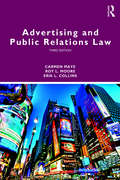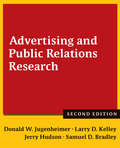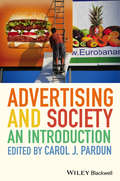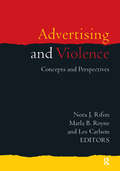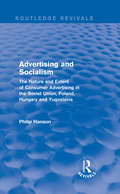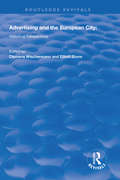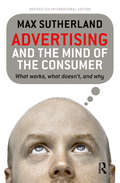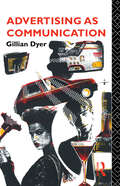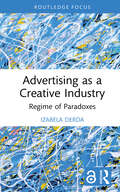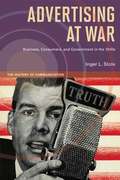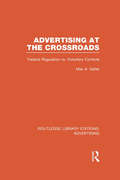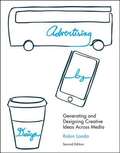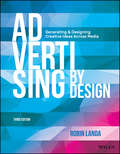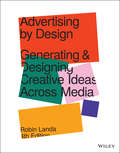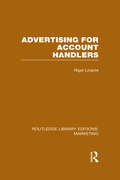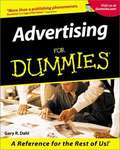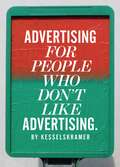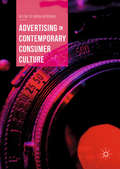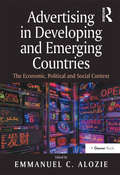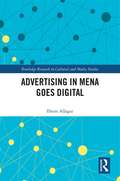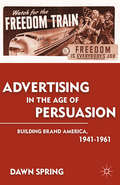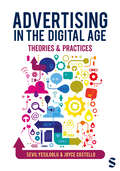- Table View
- List View
Advertising and Public Relations Law (Routledge Communication Series)
by Roy L. Moore Carmen Maye Erik L. CollinsAddressing a critical need, Advertising and Public Relations Law explores the issues and ideas that affect the regulation of advertising and public relations speech, some of the most dynamic and prevalent areas of professional communications today. This updated third edition explores the categorization of different kinds of speech and their varying levels of First Amendment protection as well as common areas of litigation for communicators such as defamation, invasion of privacy, and copyright and trademark infringement. Features of this edition include: A new chapter on Internet-related laws affecting advertising and public relations speech. History and background of major legal theories affecting professional communicators. Extended excerpts from major court decisions. Overviews of relevant federal and state regulatory schemes, including those promulgated and enforced by the FTC, FCC, FDA and others. Appendices providing a legal glossary, a chart of the judicial system, sample model releases and copyright agreement forms. The volume is developed for upper-level undergraduate and graduate students in media, advertising and public relations law or regulation courses. It also serves as an essential reference for advertising and public relations practitioners.
Advertising and Public Relations Research
by Donald W. Jugenheimer Larry D. Kelley Jerry Hudson Samuel BradleyDesigned to serve as a comprehensive, primary text for research methods courses in advertising and/or public relations programs, this book concentrates on the uses and applications of research in advertising and public relations situations. The authors' goal is to provide the information needed by future practitioners to commission and apply research to their work problems in advertising and public relations.
Advertising and Society: An Introduction
by Carol J. PardunNow revised and updated to reflect the impact of emerging technologies, this new edition of Advertising and Society: Controversies and Consequences examines the evolution of advertising and its influence on society. Expanded with five new chapters covering the impact of emerging technologies, including the evolution of Direct to Consumer (DTC) pharmaceutical advertising; product placement in various media; and the growing intrusiveness of Internet marketing Explores a broad range of topics including alcohol, tobacco, and sex in advertising; the pros and cons of negative political adverts; advergrames; and the use of stereotypes Examines the impact of advertising through its distinctive ‘point/counterpoint’ format –designed to spark discussion and help students understand the complexities of the issues being presented Lends substantial clarity to the subject, uniquely balancing criticism and practice within one text Includes chapter-level overviews and summaries of the topic history and key issues, along with student-friendly features such as ideas for papers and questions for discussion
Advertising and Violence: Concepts and Perspectives
by Nora J. Rifon Marla B Royne Les CarlsonAdvertising and Violence identifies and analyzes the important issues related to violence in advertising and its overall effects on society. The book is based on a widely cited special issue of the Journal of Advertising and includes eight new chapters that expand the book's coverage.The objective of the book is to compile a compendium of current thinking, perspectives, theoretical viewpoints, and research relevant to the violence and advertising interface. The chapter authors, all notable experts in the field, take a multidisciplinary approach that incorporates perspectives from disciplines other than marketing in order to provide a broad-based view of how advertising and violence coalesce and the policy implications of this juxtaposition.
Advertising and socialism: The nature and extent of consumer advertising in the Soviet Union, Poland
by Philip HansonThis study looks at the tiny but growing volume of consumer advertising even in countries such as the Soviet Union, which had detailed central planning, and substantially more in the recently decentralised Hungarian economy and pre-invasion Czechoslovakia. And of course, outside the Soviet orbit there was the relatively market-oriented and Westernised Yugoslav economy. This suggested that there were after all some interesting questions to answer: Why did an administrative economy like the Soviet one have any domestic consumer advertising at all, and why was it, apparently, growing? What did evidence from Hungary and Yugoslavia suggest about the scale and functions of advertising in more decentralised socialist economies? This title was first published in 1974.
Advertising and the European City: Historical Perspectives (Routledge Revivals)
by Clemens Wischermann Elliott ShoreFirst published in 2000, this volume responds to the rise and spread of advertising throughout Europe and the world in the past one and a half centuries which is breathtaking in its scope and influence, now part of the way we think and live. Historians are only just beginning to understand this process, replacing outmoded theories of manipulation which focused on the advertiser with more sophisticated cultural explanations that centre on the way consumers filter and select messages creating new worlds of perception. The authors of this work find the origins and trace the development of this new world or perception in the modern city: London and Paris, the forerunners, and the cities and larger towns of France, Germany, Belgium and the Netherlands, where advertising created new urban perceptions, leading to new avenues of consumption and altered lifestyles. Advertising is viewed in this work as a new way of perceiving and organising the world of the city-dweller, a visual culture, a way of attaching meaning to things and to words, or rearranging the mental map of modern life.
Advertising and the Mind of the Consumer: What works, what doesn't and why
by Max SutherlandBy the time we die, we will have spent an estimated one and a half years just watching TV commercials. Advertising is an established and ever-present force and yet, as we move into the new century, just how it works continues to be something of a mystery.In this 3rd international edition of Advertising and the Mind of the Consumer, renowned market researcher and psychologist Max Sutherland reveals the secrets of successful campaigns over a wide range of media, including the web and new media. Using many well-known international ads as examples, this book takes us into the mind of the consumer to explain how advertising messages work - or misfire - and why.Advertising and the Mind of the Consumer is not just a 'how to' book of tricks for advertisers, it is a book for everyone who wants to know how advertising works and why it influences us-for people in business with products and services to sell, for advertising agents, marketers, as well as for students of advertising and consumer behaviour.'Essential reading for all practitioners and everyone interested in how advertising works .' - John Zeigler, DDB Worldwide.'Finally, a book that evades the 'magic' of advertising and pins down the psychological factors that make an ad succesful or not. It will change the way you advertise and see ads.' - Ignacio Oreamuno, President, ihaveanidea.org'. reveals the secrets of effective advertising gleamed from years of sophisticated advertising research. It should be on every manager's bookshelf.' - Lawrence Ang, Senior Lecturer in Management, Macquarie Graduate School of Management'Breakthrough thinking. I have been consulting in the advertising business and have taught graduate level advertising courses for over 20 years. I have never found a book that brought so much insight to the advertising issues associated with effective selling.' - Professor Larry Chiagouris, Pace University'Puts the psyche of advertising on the analyst's couch to reveal the sometimes surprising mind of commercial persuasion.' - Jim Spaeth, Former President, Advertising Research Foundation
Advertising and the World Wide Web
by Esther Thorson David W. SchumannThe chapters provide a wide-ranging view of issues addressing how advertisers can proceed on the Internet and World Wide Web. An initial chapter traces the development of Web advertising from its very beginnings as it was represented and discussed in the pages of Advertising Age. Although there is a noticeable trend to define Web advertising by comparing it to traditional media, it is clear that Web advertising just won't fit the old mold. Keith Reinhard of DDB Needham actually articulates this linkage between the old and new in his invited chapter. What the reader will encounter in Advertising and the World Wide Web is a solid conception of how Web advertising is different from anything that has come before. There are numerous discussions on consumer and advertiser interactivity, the role of Web advertising within larger campaigns, audience segmentation, and alternative Web-based promotion formats. The five sections cover definition and theory, structure, specific applications, legal issues, and the voice of the practitioner. Although there remain a few nay-sayers concerning the future of Web advertising, the reader will be able to see just how incredibly high-impact this new medium has become and the vast potential that it holds for future promotional endeavors.
Advertising as Communication (Studies in Culture and Communication)
by Gillian DyerAdvertising is a form of communication that constantly impinges on our daily lives, yet we are often unaware of its more subtle form of persuasion, or of the extent to which it manipulates our (consumer) culture. This book sets out to examine advertising as a form of communication in contemporary society and also places it in its wider cultural and economic context.
Advertising as a Creative Industry: Regime of Paradoxes (Routledge Research in the Creative and Cultural Industries)
by Izabela DerdaAt the crossroads of culture and commerce, the advertising industry is a regime of paradoxes. This book examines the place of advertising in today’s creative industries, exploring the major challenges advertisers confront as they engage with other creative sectors. Izabela Derda, author, media scholar, and industry expert, offers insights into how the industry keeps deconstructing its own creative processes and collaborative models as it attempts to stay relevant. Through extensive case studies and interviews with industry professionals and thought leaders, this book examines the sector’s struggle to adapt to new business models and to monetize creativity in today’s media landscape, from re-engaging audiences through media more typical of arts and entertainment to managing intricate cross-sectoral creative collaborations. From redesigning workplaces to satisfy the expectations of the youngest generations of creatives to reconsidering the paradigm of conventional creative teams, the advertising sector has swiftly adjusted to the seismic changes in today’s media landscape. The book will be of interest to scholars and students of creative media, advertising, and media studies, as well as those interested in understanding the changing complexities and latest innovations of the creative industries. Advertising professionals, artists, and policymakers will find relevant insights and possible solutions for the major challenges facing the advertising industry today.
Advertising at War: Business, Consumers, and Government in the 1940s
by Inger L StoleAdvertising at War challenges the notion that advertising disappeared as a political issue in the United States in 1938 with the passage of the Wheeler-Lea Amendment to the Federal Trade Commission Act, the result of more than a decade of campaigning to regulate the advertising industry. Inger L. Stole suggests that the war experience, even more than the legislative battles of the 1930s, defined the role of advertising in U.S. postwar political economy and the nation's cultural firmament. She argues that Washington and Madison Avenue were soon working in tandem with the creation of the Advertising Council in 1942, a joint effort established by the Office of War Information, the Association of National Advertisers, and the American Association of Advertising Agencies. Using archival sources, newspapers accounts, and trade publications, Stole demonstrates that the war elevated and magnified the seeming contradictions of advertising and allowed critics of these practices one final opportunity to corral and regulate the institution of advertising. Exploring how New Dealers and consumer advocates such as the Consumers Union battled the advertising industry, Advertising at War traces the debate over two basic policy questions: whether advertising should continue to be a tax-deductible business expense during the war, and whether the government should require effective standards and labeling for consumer products, which would render most advertising irrelevant. Ultimately the postwar climate of political intolerance and reverence for free enterprise quashed critical investigations into the advertising industry. While advertising could be criticized or lampooned, the institution itself became inviolable.
Advertising at the Crossroads: Federal Regulation Vs. Voluntary Controls (Routledge Library Editions: Advertising)
by Max A. GellerAdvertising today is not only under sterner scrutiny by the various federal regulatory and judicial bodies but is also facing an ominous storm of public criticism because of certain abuses. One of the big questions troubling advertisers, agencies and media is whether advertising will be subject to increasingly stringent governmental controls or whether it will forestall such action by mature self-regulation. In Advertising at the Crossroads the author has attempted to face the issue squarely and realistically, and to point out several constructive measures that advertising must initiate in its self-interest. First published in 1952.
Advertising by Design
by Robin LandaDon't miss the new updated edition of the complete guide to the creative processes behind successful advertising design.The second edition of Advertising by Design has been developed and greatly expanded. Sill the most comprehensive text on creative concept generation and designing for advertising, the book includes a number of features that make it an effective tool for instructors, students, or anyone interested in this field. This includes a practical approach to generating and designing creative integrated-media advertising for brands, organizations, and causes that encompasses brand-building through engagement, community building, added value, and entertainment.Fully supplemented with interviews from esteemed creative directors, along with real-world examples, Advertising by Design is both a perfect text for courses that incorporate advertising concepts and design, and a valuable reference for anyone interested in the creative side of advertising."While the blank piece of paper is exciting, it can also be a very scary place. Robin Landa has created a valuable tool for jump-starting the creative process across all platforms. This book is a must-read for beginners and seasoned veterans."-- Paul Renner, EVP Group Creative Director, Arnold Worldwide, Boston"This is still the quintessential, step-by-step textbook for anyone interested in learning or teaching the fundamentals of advertising."-- Alan Rado, IADT/Harrington College of Design"The most enlightening textbook on advertising I've ever seen. A must-read for any student of the ad biz." -- Drew Neisser, CEO, Renegade"So perfect for a creative strategist, transformational world. Very few books get it right about the evolution of creative. This one does, from strategy to storytelling to multiple media solutions. And it's still all about doing beautiful work."-- Deborah Morrison, Chambers Distinguished Professor of Advertising, University of Oregon
Advertising by Design: Generating and Designing Creative Ideas Across Media
by Robin LandaRecognizing that good advertising is about creating an engaging story, the Third Edition of Advertising by Design looks at advertising design as a form of content creation that blends ideas, information, and entertainment in a way that can work for a ranged of media or audience types. Fully updated to align with the latest trends in the advertising industry, the book includes new information on transmedia campaigns, social media, digital media, pull marketing, creative content, and branded entertainment. It continues to offer a step-by-step introduction to the fundamentals of advertising design, giving students the guidance they need to jump-start their creative process no matter what media channel they're working in.
Advertising by Design: Generating and Designing Creative Ideas Across Media
by Robin LandaA real-world introduction to advertising design and art direction, updated and revised for today's industry The newly revised Fourth Edition of Advertising by Design: Generating and Designing Creative Ideas Across Media delivers an invigorating and cutting-edge take on concept generation, art direction, design, and media channels for advertising. The book offers principles, theories, step-by-step instructions, and advice from esteemed experts to guide you through the fundamentals of advertising design and the creative process. With a fresh focus on building a coherent brand campaign through storytelling across all media channels, Advertising by Design shows you how to conceive ideas based on strategy, build brands with compelling advertising, and encourage social media participation. You’ll also get insights from guest essays and interviews with world-leading creatives in the advertising industry. The book is filled with practical case studies that show real-world applications. You’ll also benefit from coverage of A quick start guide to advertising A thorough introduction to what advertising is, including its purpose, categories, forms, media channels, social media listening, and its creators Creative thinking strategies and how to generate ideas based on creative briefs Utilizing brand archetypes and creating unique branded content Composition by design, including the parts of an ad, the relationship between images and copy, basic design principles, and points of view How to build a brand narrative in the digital age Copywriting how-to’s for art directors and designers Experiential advertising An examination of digital design, including subsections on the basics of mobile and desktop website design, motion, digital branding, and social media design Perfect for students and instructors of advertising design, art direction, graphic design, communication design, and copywriting, Advertising by Design also will earn a place in the libraries of business owners, executives, managers, and employees whose work requires them to understand and execute on branding initiatives, advertising campaigns, and other customer-facing content.
Advertising for Account Holders (Routledge Library Editions: Marketing)
by Nigel LinacreThe account handler is a key person within an advertising agency, liaising between the client on the outside and the planning, creative and media function within. This book presents essential checklists for each aspect of the planner’s role: presentations made to clients, briefing creative and media teams, and helping to get the best out of both client and agency.
Advertising for Dummies
by Gary DahlFor small businesses, effective advertising can mean the difference between fortune and failure. But if you're going to throw your money into advertising willy-nilly you might as well just throw it away. And if your business can't afford a big advertising firm you may have to write your own advertising copy. But could you? Don't worry, because with Advertising For Dummies, you will! If you need help figuring out which advertising media offers you the most exposure or determining how much you can realistically spend on your advertising budget, then look no further. If you want shortcuts, insights, techniques, and money-saving facts that will get you the most bang for your advertising buck, then this is the book for you. It's a guide to advertising for the rest of us - people for whom an advertising budget represents an important percentage of gross income and, therefore, must be spent very wisely. Inside you'll find out how to: Devise a realistic advertising budget Define and position your message Create TV, radio, billboard, and Internet advertising Use "ad-speak" effectively This helpful guide covers every media, from Internet advertising to TV and radio to billboards or newspapers. You'll master the fundamentals of advertising, learn to generate fresh ideas, and write great ads. You'll write great press releases and discover the secret to saving money through co-op ads. And there's more: When and how to hire an ad agency Why people choose one product over another Creating brochures and direct mail pieces Designing an effective, inviting Web site Sticking to a budget The difference between PR and publicity Ten secrets to writing memorable ads Sometimes if you want something done right you have to do it yourself. Advertising For Dummies presents the tips and tricks that advertising professionals use every day to get their message across. Now, you can use those same strategies and tactics to get the word out about your small business - and watch the money roll in!
Advertising for People Who Don't Like Advertising
by KesselsKramerThis is a book by a company that dislikes advertising as much as anyone. Nevertheless, it makes adverts. It has worked with global brands to produce fashion collections and promoted a town with a mass wedding. It creates advertising with more human, truthful communications. The company's name is KesselsKramer.This book describes how to make something you like out of something you don't. As well as drawing on its own experiences, KesselsKramer listens and learns from those who doubt the advertising industry. Stefan Sagmeister explains how quitting work makes you better at working; Hans Aarsman discusses authenticity in image-making; and Alex Bogusky looks at ways to help capitalism grow up.Advertising for People Who Don't Like Advertising is partly a creative handbook and partly an attempt to make the world a very slightly better place. It's intended for anyone who has ever hated a web banner or zapped an ad break.
Advertising for People Who Don't Like Advertising
by KesselsKramer KesselsKramerThis is a book by a company that dislikes advertising as much as anyone. Nevertheless, it makes adverts. It has worked with global brands to produce fashion collections and promoted a town with a mass wedding. It creates advertising with more human, truthful communications. The company's name is KesselsKramer.This book describes how to make something you like out of something you don't. As well as drawing on its own experiences, KesselsKramer listens and learns from those who doubt the advertising industry. Stefan Sagmeister explains how quitting work makes you better at working; Hans Aarsman discusses authenticity in image-making; and Alex Bogusky looks at ways to help capitalism grow up.Advertising for People Who Don't Like Advertising is partly a creative handbook and partly an attempt to make the world a very slightly better place. It's intended for anyone who has ever hated a web banner or zapped an ad break.
Advertising in Contemporary Consumer Culture
by Hélène de Burgh-WoodmanThis is the first scholarly book dedicated to reading the work of contemporary filmmakers and their impact on modern marketing and advertising. Drawing from consumer culture theory, film and media studies, the author presents an expansive analysis of a range of renowned filmmakers who have successfully applied their aesthetic and narrative vision to commercial advertising. It challenges some traditional advertising tropes and sheds light on the changing nature of advertising in the contemporary media context. Utilising Deleuze and Guattari’s notion of assemblage, this book addresses themes of spatiality and time, narrative and aesthetics and consumer reception within a new frame of reference that re-contextualises classical concepts of genre, platform and aesthetic categories. These diverse elements are embedded into a larger discussion of the resonance of contemporary advertising for consumer culture and the implications of the hybridity characteristic of convergent media platforms for understanding the potential of advertising in the twenty-first century. It offers a cutting-edge, interdisciplinary perspective for researchers, academics, and practitioners working in marketing communications, advertising, and media studies.
Advertising in Developing and Emerging Countries: The Economic, Political and Social Context
by Emmanuel C. AlozieThis indispensable study offers an in-depth analysis of advertising in developing and emerging economies as they join the global market and seek to improve the socio-economic condition of their citizens. Advertising in Developing and Emerging Countries illustrates the challenges and opportunities for advertising in these countries, and explores their critical relationship with developed economies with a multifaceted analysis of the role of advertising in an interdependent global economy. The contributors, academic and professional, with world wide experiences, examine the unique political, cultural and religious systems that affect advertising in a country, in both Western and non-Western contexts, and chart the consequences of its development from democratization to privatization to cultural hegemony. Emmanuel C. Alozie has put together an essential and unique book for scholars and students of public relations, advertising, marketing, media and international studies, as well as practitioners, those teaching and undertaking professional courses, and researchers in this critical field.
Advertising in MENA Goes Digital
by Ilhem AllaguiAn inside story of local, regional and global advertising in the Middle East. Grounded in empirical research and theories, this book explores the evolution of advertising practices, audiences, digital media and communication technologies in increasingly complex MENA environments. Advertising in MENA Goes Digital draws on empirical research and theories to explore how the adoption of digital technology in the Middle East and North Africa, through information and communication technologies, social media and mobile, have shaped creative advertising solutions. Through key case studies of marketing in the pan-Arab market from regional and global brands as Procter & Gamble, Olay, Vimto, and MTV Arabia, the book sheds light on the intricate relationship between technological and societal development and advertising practice. It examines cultural constituents such as humor, religion and gender, political advertising driven by the new wave of democracy in the region and digital activism, technological and digital transformations and the economic ways advertising support new media start-ups. Supported by examples and campaigns, the book discusses the way global or regional brands standardized or localized their messaging while adopting international techniques but market-oriented solutions. The book will key reading for scholars and students in advertising, marketing, business, journalism, cultural studies and media in addition to Middle East Studies. It is also an essential text for media and marketing communication industry professionals, and will appeal to those interested in the global-local dichotomy and promotional communications.
Advertising in the Age of Persuasion: Building Brand America 1941–1961
by D. SpringAdvertising in the Age of Persuasion documents and analyzes the implementation of the American strategy of consumerism during the 1940s and 1950s, and its ongoing ramifications. Beginning with World War II, and girded by the Cold War, American advertisers, brand name corporations, and representatives of the federal government institutionalized a system of consumer capitalism which they called free enterprise. In their system, government and business worked together to create consumer republics, democracies based on the mass consumption of brand name goods using advertising across all major media to sell products and distribute information. Many of the free enterprise evangelists believed it represented the fulfillment of America's god-ordained mission. They envisioned an American lead global consumer order supported by advertising based media where the brand took precedence over the corporation that owned it; and advertising, propaganda and public relations were considered the same thing. To support this system, they created a network and process for disseminating persuasive information that survives into the 21st Century.
Advertising in the Aging Society: Understanding Representations, Practitioners, And Consumers In Japan
by Florian Kohlbacher Michael PrielerPopulation aging is a powerful megatrend affecting many countries around the world. This demographic shift has vast effects on societies, economies and businesses, and thus also for the advertising industry. Advertising in the Aging Society presents insights from a large-scale content analysis as well as questionnaire surveys among advertising practitioners and consumers in Japan. As the most aged society in the world, Japan lends itself as particularly suitable to study the implications of population aging. This book shows that older people, and especially older women, are highly underrepresented in advertising and are generally portrayed in stereotypical, albeit not necessarily unfavorable ways. This is despite the fact that advertising practitioners have a generally positive view towards using older models, even though only for an older target audience. Finally the book explore how both younger and older consumers perceive the representation of older people in advertising as stereotypical and partly negative, and are willing to boycott companies portraying older people negatively.
Advertising in the Digital Age: Theories and Practices
by Joyce Costello Sevil YesilogluAdvertising is everywhere. Whether you realise it or not, it′s there when you watch your favourite Netflix show, when you scroll through Instagram, and when you search on Google. What′s more, advertisers are becoming more savvy than ever, using new technologies to target adverts to you specifically. So what are we to make of all this? This book will equip you with a thorough understanding of today′s media environment and how ′online′ advertising differs from traditional ′offline′ models. In an age of influencers, big data, AI and social media, the world of advertising looks very different from how it did a generation ago. You will learn not only about various types of advertising, but also about its impact on viewers, from our buying habits to possible harm. Tying theory and concepts to practice, this volume is the ideal complement to courses in advertising, digital media and communication, and will enable you to form a clear picture of the reality of working across promotional media industries.
